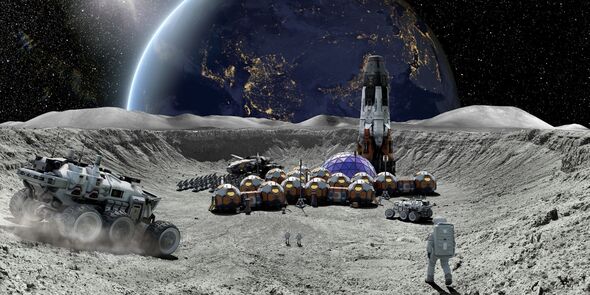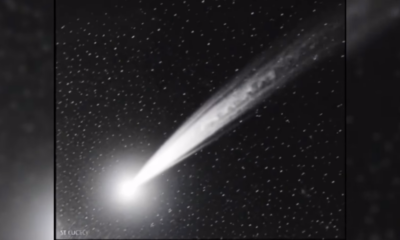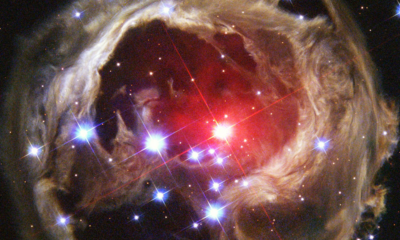Science
Scientists Plan Lunar Base by 2030, Emphasizing Nuclear Power

Scientists are advancing plans for a permanent human presence on the Moon by 2030, with a crucial focus on nuclear power technology. As various governments and space agencies, including NASA and the European Space Agency, explore the establishment of lunar bases, reliable energy sources will be essential for supporting life and conducting research in these environments.
Nuclear energy stands out as a promising solution to the challenges presented by the Moon’s harsh conditions. Unlike solar power, which is unreliable during the two-week lunar night, nuclear power can provide a stable energy supply throughout extended periods of darkness. Dr. Tim Gregory, a cosmochemist, emphasized the importance of this technology during his presentation at New Scientist Live in October. He stated, “If you want people living on the Moon long term, you need a stable and consistent source of energy. That’s exactly what nuclear can do.”
The ambitious plans include NASA’s goal of deploying a nuclear reactor on the Moon by 2030. While some may view this timeline as optimistic, Dr. Gregory believes that even a slight delay would not significantly hinder progress. He asserted, “I’d be shocked if there aren’t nuclear reactors on the Moon supporting human habitats within my lifetime.”
Challenges related to public perception of nuclear power remain significant. Despite concerns about safety and waste, Dr. Gregory noted that nuclear energy has a strong safety record. He pointed out, “Per terawatt-hour of electricity, nuclear is as safe as wind and solar. More people die from fossil fuel air pollution every couple of hours than have died of nuclear power ever.” He further explained that the waste produced from nuclear energy is minimal, approximating the volume of a small coffee cup for the entire lifespan of energy consumption.
Existing solutions for nuclear waste management, such as those implemented in Finland, highlight the feasibility of long-term storage. Dr. Gregory stated, “By leaving it underground for a million years or so, its radioactivity will decay into almost nothingness.” He urged that misconceptions surrounding nuclear power are often misplaced, arguing for its potential benefits in space exploration.
The push for nuclear energy is not just about providing power; it represents a pathway to establishing sustainable human habitats on the Moon. With the potential for nuclear reactors, scientists envision a future that includes laboratories, greenhouses, and manufacturing facilities in lunar settlements. Dr. Gregory remarked, “Nuclear is misunderstood on Earth, but in space, I think people will quickly see its value.”
As international efforts continue to explore small modular reactors and space-rated designs, the prospect of humans living and working on the Moon inches closer to reality. With nuclear power as a foundational technology, the dream of lunar colonies is becoming increasingly attainable. Dr. Gregory concluded, “You couldn’t ask for a better technology to take with you if you want to live on another world.”
The advancements in nuclear energy not only promise to facilitate lunar exploration but also open up new possibilities for human endeavors beyond Earth, transforming what was once considered science fiction into a tangible future.
-

 World2 days ago
World2 days agoCoronation Street’s Shocking Murder Twist Reveals Family Secrets
-

 Entertainment4 months ago
Entertainment4 months agoKate Garraway Sells £2 Million Home Amid Financial Struggles
-

 Entertainment3 months ago
Entertainment3 months agoAnn Ming Reflects on ITV’s ‘I Fought the Law’ Drama
-

 Health3 months ago
Health3 months agoKatie Price Faces New Health Concerns After Cancer Symptoms Resurface
-

 Entertainment3 weeks ago
Entertainment3 weeks agoCoronation Street Fans React as Todd Faces Heartbreaking Choice
-

 World3 weeks ago
World3 weeks agoBailey Announces Heartbreaking Split from Rebecca After Reunion
-

 Entertainment5 days ago
Entertainment5 days agoTwo Stars Evicted from I’m A Celebrity Just Days Before Finale
-

 World5 days ago
World5 days agoKevin Sinfield Exceeds Fundraising Goal Ahead of Final Marathons
-

 Entertainment3 months ago
Entertainment3 months agoCoronation Street’s Carl Webster Faces Trouble with New Affairs
-

 Entertainment3 months ago
Entertainment3 months agoWhere is Tinder Swindler Simon Leviev? Latest Updates Revealed
-

 Entertainment4 months ago
Entertainment4 months agoMarkiplier Addresses AI Controversy During Livestream Response
-

 Science2 months ago
Science2 months agoBrian Cox Addresses Claims of Alien Probe in 3I/ATLAS Discovery





















